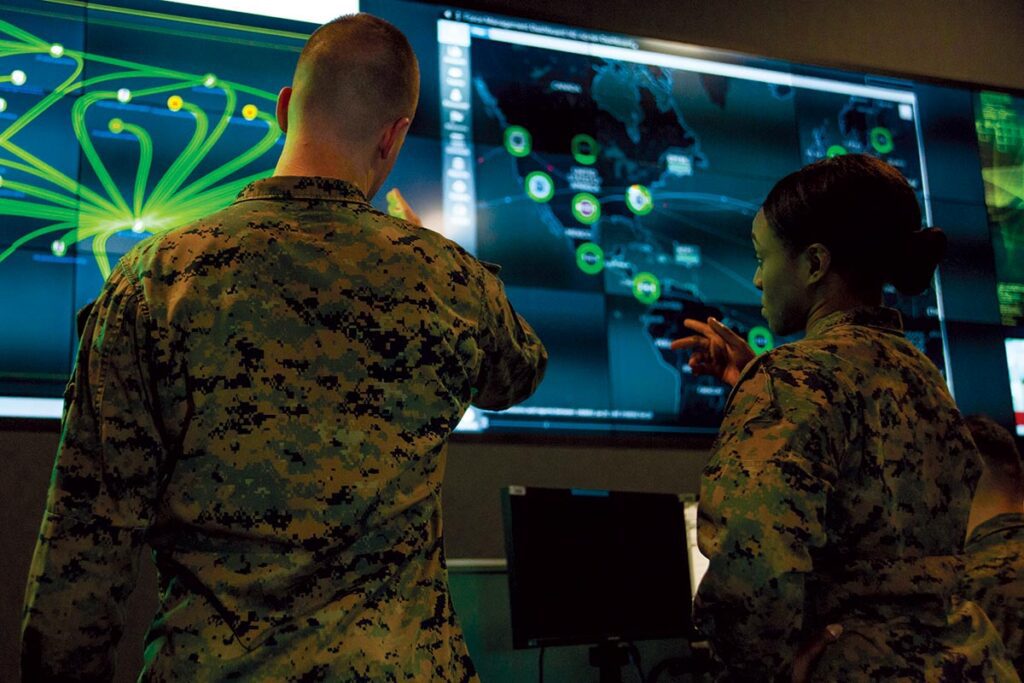This article explores the role of technology in military operations, specifically focusing on the cyberspace battlefield. With the advancement of technology, the battlefield has expanded beyond physical borders, and the cyberspace battlefield has emerged as a critical aspect of modern warfare. Cyber warfare and information operations are key elements in this domain, involving offensive and defensive actions, influencing public opinion, and gathering intelligence. Technology enables armed forces to engage in intelligence gathering, cybersecurity measures, network-centric warfare, and command and control. Emerging technologies like AI and autonomous systems shape the future of warfare, but ethical and legal challenges must be considered. Ultimately, technology in military operations requires responsible and effective use.
Navigating the Cyberspace Battlefield: Examining the Role of Technology in Military Operations
Introduction
In today’s digital world, technology plays a crucial role in all aspects of society, including military operations. The cyberspace battlefield has become a new arena where conflicts and wars are fought. This article aims to explore the role of technology in military operations and how it enables armed forces to navigate this complex space effectively.
The Emergence of the Cyberspace Battlefield
With the advancement of technology, the battlefield has expanded beyond physical borders to include the vast space of cyberspace. The cyberspace battlefield is a domain where nations, non-state actors, and individuals engage in intelligence gathering, cyberattacks, and defensive operations. As governments and armed forces become increasingly reliant on technology, this virtual battlefield has become a critical aspect of modern warfare.
Cyber Warfare and Information Operations
One of the key elements of military operations in cyberspace is cyber warfare. Cyber warfare refers to offensive and defensive actions taken by state and non-state actors to disrupt or destroy enemy information systems, networks, and infrastructures. These attacks can range from simple viruses and hacking attempts to sophisticated operations targeting critical infrastructure or government networks.
Another aspect of military operations in cyberspace is information operations. Information operations involve the use of technology to influence public opinion, spread disinformation, or gather intelligence. In this regard, technology plays a significant role in shaping the narrative and perception of conflicts, thus impacting strategic outcomes.
Intelligence Gathering and Cyber Reconnaissance
In the cyberspace battlefield, technology enables armed forces to engage in intelligence gathering and cyber reconnaissance. Through the use of advanced algorithms, machine learning, and data analysis, military agencies can collect and analyze large volumes of data from various sources, including social media platforms, online forums, and intercepted communications. This information is crucial in understanding the enemy’s capabilities, intentions, and vulnerabilities.
Cybersecurity and Defending Against Cyber Attacks
As technology enables offensive cyber operations, it is equally crucial for armed forces to protect their own networks from cyber attacks. Technology plays a critical role in developing cybersecurity measures and creating secure networks and systems. This involves encryption, firewalls, intrusion detection and prevention systems, and continuous monitoring of network traffic. Additionally, training and education of personnel to be aware of potential cyber threats are vital components of cybersecurity in military operations.
Network-Centric Warfare and Command and Control
Technology has also revolutionized the concept of network-centric warfare. Network-centric warfare involves the integration of various military systems, sensors, and platforms into a single network, enabling real-time information exchange and decision-making. This interconnectedness allows for more efficient command and control, improved situational awareness, and enhanced coordination between different units and forces.
Emerging Technologies in Military Operations
The role of technology in military operations is continuously evolving, with emerging technologies shaping the future of warfare. One such technology is artificial intelligence (AI), which can enhance decision-making processes, automate tasks, and identify patterns or anomalies in vast amounts of data. Additionally, advances in autonomous systems, such as drones and unmanned vehicles, provide new capabilities for reconnaissance, surveillance, and even combat operations.
The Ethical and Legal Challenges
With the increased reliance on technology in military operations, ethical and legal challenges arise. The use of cyber warfare and information operations raises questions about privacy, sovereignty, and the rules of engagement. Additionally, the potential for unintended consequences, such as collateral damage or escalation of conflicts, requires careful consideration when employing advanced technologies in the cyberspace battlefield.
Conclusion
As technology continues to advance, its role in military operations will only grow. Armed forces must adapt to this new cyberspace battlefield, equipping themselves with the necessary technologies and expertise to navigate and succeed in this virtual domain. However, it is imperative to balance the advantages provided by technology with ethical considerations and legal frameworks to ensure responsible and effective use in military operations.
